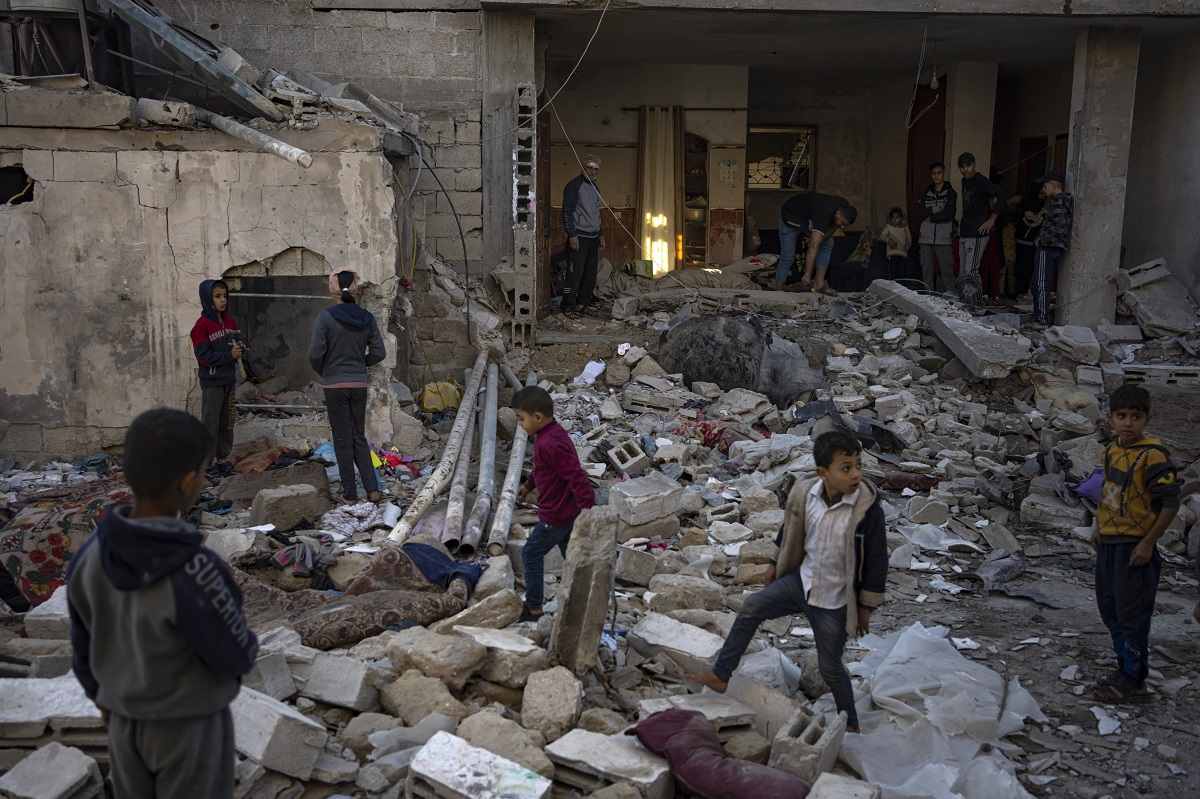Netanyahu Says Gaza War on Hamas Will Go on for ‘Many More Months,’ Thanks US for New Weapons Sales

Palestinians look at the destruction after an Israeli strike in Rafah, southern Gaza Strip, Friday, Dec. 29, 2023.
9:25 JST, December 31, 2023
DEIR AL-BALAH, Gaza Strip (AP) — Prime Minister Benjamin Netanyahu said Saturday that Israel’s war on Hamas in Gaza will continue for “many more months,” pushing back against persistent international cease-fire calls after mounting civilian deaths, hunger and mass displacement in the besieged enclave.
Netanyahu thanked the Biden administration for its continued backing, including approval for a new emergency weapons sale, the second this month, and prevention of a U.N. Security Council resolution seeking an immediate cease-fire. Israel argues that ending the war now would mean victory for Hamas, a stance shared by the Biden administration, which at the same time urged Israel to do more to avoid harm to Palestinian civilians.
In new fighting, Israeli warplanes struck the urban refugee camps of Nuseirat and Bureij in the center of the territory Saturday as ground forces pushed deeper into the southern city of Khan Younis.
The Health Ministry in Gaza said Saturday that more than 21,600 Palestinians have been killed in Israel’s unprecedented air and ground offensive since the deadly Oct. 7 Hamas attack on southern Israel. The ministry, which does not distinguish between the deaths of civilians and combatants, said 165 Palestinians were killed over the past 24 hours. It has said about 70% of those killed have been women and children.
The number of Israeli soldiers killed in Gaza combat rose to 170, after the military announced two more deaths Saturday.
The war has displaced some 85% of Gaza’s 2.3 million residents, sending swells of people seeking shelter in Israeli-designated safe areas that the military has nevertheless bombed. Palestinians are left with a sense that nowhere is safe in the tiny enclave.
With Israeli forces expanding their ground offensive this week, tens of thousands more Palestinians streamed into the already crowded city of Rafah at the southernmost end of Gaza.
Thousands of tents and makeshift shacks have sprung up on Rafah’s outskirts next to U.N. warehouses. Displaced people arrived in Rafah on foot or on trucks and carts piled high with mattresses. Those who did not find space in overwhelmed shelters pitched tents on roadsides.
“We don’t have water. We don’t have enough food,” Nour Daher, a displaced woman, said Saturday from the sprawling tent camp. “The kids wake up in the morning wanting to eat, wanting to drink. It took us one hour to find water for them. We couldn’t bring them flour. Even when we wanted to take them to toilets, it took us one hour to walk.”
In the Nuseirat camp, resident Mustafa Abu Wawee said a strike hit the home of one of his relatives, killing two people.
“The (Israeli) occupation is doing everything to force people to leave,” he said over the phone while helping to search for four people missing under the rubble. “They want to break our spirit and will, but they will fail. We are here to stay.”
MORE U.S. WEAPONS FOR ISRAEL
The State Department said Friday that Secretary of State Antony Blinken told Congress he approved a $147.5 million sale for equipment, including fuses, charges and primers, that is needed for 155 mm shells Israel bought previously.
It marked the second time this month that the Biden administration is bypassing Congress to approve an emergency weapons sale to Israel. Blinken made a similar decision on Dec. 9 to approve the sale to Israel of nearly 14,000 rounds of tank ammunition worth more than $106 million.
Both moves have come as President Joe Biden’s request for a nearly $106 billion aid package for Ukraine, Israel and other national security needs remains stalled in Congress, caught up in a debate over U.S. immigration policy and border security. Some Democratic lawmakers have spoken of making the proposed $14.3 billion in American assistance to its Mideast ally contingent on concrete steps by Netanyahu’s government to reduce civilian casualties in Gaza during the war with Hamas.
THE WAR’S TIMELINE
Blinken, who has repeatedly traveled to the Middle East during the war, was expected back in Israel and other countries in the region in January. U.S. officials have urged Israel to start shifting from high intensity combat to more targeted operations, but said they were not imposing a deadline.
Netanyahu said Israel needs more time.
“As the chief of staff said this week, the war will continue many more months,” he told a televised news conference Saturday. “My policy is clear. We will continue to fight until we have achieved all the objectives of the war, first and foremost the annihilation of Hamas and the release of all the hostages.”
More than 120 hostages remain in Gaza, after militants seized more than 240 in the Oct. 7 assault that also killed some 1,200 people, mostly civilians.
Netanyahu is also at odds with the Biden administration over who should run Gaza after the war. He has rejected the U.S.-backed idea that a unified Palestinian government should run both Gaza and parts of the Israeli-occupied West Bank as a precursor to eventual statehood. Instead, he has insisted on open-ended Israeli security control in Gaza, without saying what would come next.
TRADING FOR HOSTAGES
Families of hostages and their supporters have demanded that the government prioritize hostage releases over other war objectives, and have staged large protests every weekend, including Saturday.
Egypt, one of the mediators between Israel and Hamas, has proposed a multistage plan that would kick off with a swap of hostages for prisoners, accompanied by a temporary cease-fire — along the lines of an exchange during a weeklong truce in November.
Hamas insists the war must end before it will discuss hostage releases. Osama Hamdan, a senior Hamas official in Beirut, reiterated that position Saturday, but also told The Associated Press that “we have not given any final answer so far” to the Egyptian proposal.
Asked about reports of possible progress toward a deal, Netanyahu said Saturday that “we see a possibility, maybe, for movement” but that he did not want to raise “exaggerated expectations.”
DIFFICULTIES IN DELIVERING AID
More than a week after a U.N. Security Council resolution called for the unhindered delivery of aid at scale across besieged Gaza, conditions have only worsened, U.N. agencies warned.
Aid officials said the aid entering Gaza remains woefully inadequate. Distributing goods is hampered by long delays at two border crossings, ongoing fighting, Israeli airstrikes, repeated cuts in internet and phone services and a breakdown of law and order that makes it difficult to secure aid convoys, they said.
Nearly the entire population is fully dependent on outside humanitarian aid, said Philippe Lazzarini, head of UNRWA, the U.N. agency for Palestinian refugees. A quarter of the population is starving because too few trucks enter with food, medicine, fuel and other supplies — sometimes fewer than 100 trucks a day, according to U.N. daily reports.
"News Services" POPULAR ARTICLE
-

American Playwright Jeremy O. Harris Arrested in Japan on Alleged Drug Smuggling
-

Japan’s Nikkei Stock Average as JGB Yields, Yen Rise on Rate-Hike Bets
-

Japan’s Nikkei Stock Average Licks Wounds after Selloff Sparked by BOJ Hike Bets (UPDATE 1)
-

Japan’s Nikkei Stock Average Buoyed by Stable Yen; SoftBank’s Slide Caps Gains (UPDATE 1)
-

Japanese Bond Yields Zoom, Stocks Slide as Rate Hike Looms
JN ACCESS RANKING
-

Keidanren Chairman Yoshinobu Tsutsui Visits Kashiwazaki-Kariwa Nuclear Power Plant; Inspects New Emergency Safety System
-

Imports of Rare Earths from China Facing Delays, May Be Caused by Deterioration of Japan-China Relations
-

University of Tokyo Professor Discusses Japanese Economic Security in Interview Ahead of Forum
-

Tokyo Economic Security Forum to Hold Inaugural Meeting Amid Tense Global Environment
-

Japan Pulls out of Vietnam Nuclear Project, Complicating Hanoi’s Power Plans

























